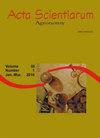Ammonia volatilization and nitrogen status in second-season corn after lime and gypsum application in no-till
IF 1.2
4区 农林科学
Q3 AGRONOMY
引用次数: 0
Abstract
In no-till (NT), liming and urea fertilization are performed on the soil surface, which can increase nitrogen (N) losses via ammonia volatilization. On the basis of N fertilization management, gypsum application provides a promising alternative for improving N uptake by plants. Therefore, the objective of this study was to evaluate the N behavior loss by NH3-N volatilization, the soil pH at a depth of 0 – 0.05 m, leaf N content, and N uptake by second-season corn after lime and gypsum application in a Rhodic Ferralsol under NT. Overall, the treatments consisted of a 4 × 4 factorial arrangement with four lime rates (0, 2.6, 5.4, and 8.1 Mg ha-1) and four gypsum rates (0, 4, 8, and 12 Mg ha-1). During the study period, second-season corn was cultivated for two years and fertilized with urea, for which the N losses through ammonia volatilization, soil pH, leaf N content, and N uptake values were quantified. The losses through ammonia volatilization were subjected to nonlinear regression using a logistic model, and the other variables were subjected to linear regressions. The lime applied by broadcasting on the soil surface in the NT increased the pH of the topsoil and increased N losses via NH3-N volatilization in the second-season corn. Further, the N losses in the NT treated with lime accounted for 58% of the applied N, which increased by 2.3 to 2.5% for each Mg ha-1 of lime applied. Therefore, lime or gypsum application did not improve the status of N in second-season corn in soils with low acidity and no S deficiency.免耕施石灰和石膏对二季玉米氨挥发和氮的影响
免耕条件下,土壤表层施用石灰和尿素,可通过氨挥发增加氮素损失。在氮肥管理的基础上,石膏的施用为提高植物对氮的吸收提供了一种有希望的替代方案。因此,本研究的目的是评估N行为由NH3-N挥发损失,土壤pH值在0 - 0.05米的深度,叶片N含量、石灰和石膏后,季玉米吸氮应用在NT下暗红色铁铝土。总的来说,4×4的阶乘的治疗包括安排四个石灰利率(0,2.6,5.4,和8.1毫克农业和四个石膏利率(0、4、8、12毫克农业)。研究期间,二季玉米种植2年,施尿素,量化氨挥发损失、土壤pH、叶片氮含量和氮吸收值。氨挥发损失采用logistic模型进行非线性回归,其他变量采用线性回归。施石灰增加了表层土壤的pH值,增加了二季玉米通过NH3-N挥发造成的N损失。石灰处理的氮素损失量占施氮量的58%,石灰每施1 Mg ha-1,氮素损失量增加2.3 ~ 2.5%。因此,在低酸性、不缺S的土壤中,石灰和石膏的施用并没有改善二季玉米的氮素状况。
本文章由计算机程序翻译,如有差异,请以英文原文为准。
求助全文
约1分钟内获得全文
求助全文
来源期刊

Acta Scientiarum. Agronomy.
Agricultural and Biological Sciences-Agronomy and Crop Science
CiteScore
2.40
自引率
0.00%
发文量
45
审稿时长
>12 weeks
期刊介绍:
The journal publishes original articles in all areas of Agronomy, including soil sciences, agricultural entomology, soil fertility and manuring, soil physics, physiology of cultivated plants, phytopathology, phyto-health, phytotechny, genesis, morphology and soil classification, management and conservation of soil, integrated management of plant pests, vegetal improvement, agricultural microbiology, agricultural parasitology, production and processing of seeds.
 求助内容:
求助内容: 应助结果提醒方式:
应助结果提醒方式:


